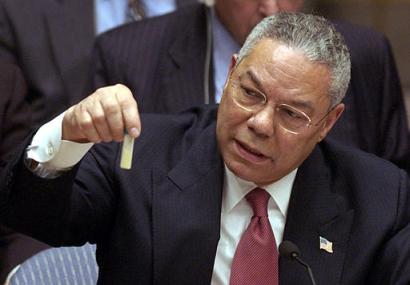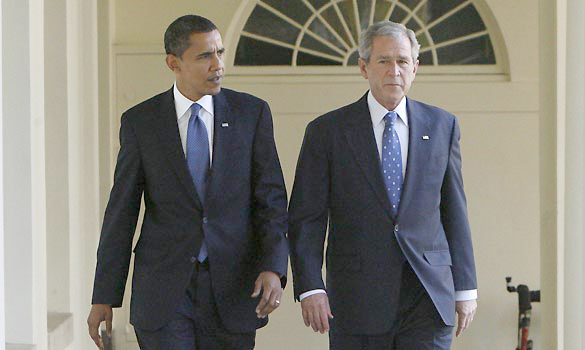Charles Duelfer, who led the CIA’s Iraq Survey Group in 2004, argues a stunning yet popularly held belief in Foreign Policy magazine, that the Bush administration did not lie about Iraq’s alleged WMD program; they were just wrong about it.
 “The intelligence wasn’t cooked or slanted to make policymakers happy,” Duelfer writes. “It was just wrong. That made Bush mistaken — but it doesn’t make him a liar.”
“The intelligence wasn’t cooked or slanted to make policymakers happy,” Duelfer writes. “It was just wrong. That made Bush mistaken — but it doesn’t make him a liar.”
The first clause in that argument is one that many on the inside disagree with. The Bush administration exerted significant pressure on the intelligence community to provide justification for the Iraq War. According to John Brennan, who was Deputy Director of the CIA at the time, “we were being asked to do things and to make sure that that justification was out there.”
“At the time there were a lot of concerns that it was being politicized by certain individuals within the administration that wanted to get that intelligence base that would justify going forward with the war,” Brennan told PBS. When asked who was exerting this pressure, Brennan said “Some of the neocons” in the administration “were determined to make sure that the intelligence was going to support the ultimate decision.”
And Paul Pillar, the CIA officer who led the hurried effort to provide Congress with a National Intelligence Estimate on Iraq’s WMD programs – an estimate that ultimately contained falsities that the administration retroactively used to justify their incorrect assessments – said, “The atmosphere in which they were working, in which a policy decision clearly had already been made, in which intelligence was being looked to to support that decision rather to inform decisions yet to be made, was a very important part of the atmosphere.”
According to Lawrence Wilkerson, chief of staff for Secretary of State Colin Powell, in the lead up to the invasion Powell himself said, “I wonder what will happen when we put 500,000 troops into Iraq and comb the country from one end of the other and find nothing.”
In addition to widespread assessments like these from people on the inside, it’s clear from the historical record that the Bush administration did not base their decision to go to war in Iraq on intelligence assessing Iraq had WMDs. As CBS News reported in 2009, “barely five hours after American Airlines Flight 77 plowed into the Pentagon, Defense Secretary Donald H. Rumsfeld was telling his aides to come up with plans for striking Iraq.”
The hodgepodge of justifications sputtering out from the administration in the lead up to the war also undercuts the argument that anyone was truly concerned about an actual WMD threat. Officials justified war on the basis of everything from an unsubstantiated connection to al-Qaeda and the 9/11 attacks to Saddam’s own human rights violations to spreading democracy, among others.
“Given Saddam’s history,” Duelfer writes in defense of his theory, “it wasn’t crazy for the intelligence community to believe that he would reconstitute his WMD programs.”
Indeed, it wasn’t. What would have been crazy is if Saddam never planned to reconstitute his WMD programs. The most amateur observer of international relations knows such programs provide a valuable deterrent that discourages rampaging military superpowers like the United States from attacking. Given the obvious target Saddam had become in the eyes of Washington, it would have been rather self-destructive of him to completely forswear WMDs.
This is an analysis that was included in the infamous intelligence estimate that bolstered the conclusion that Saddam had WMDs. As Paul Pillar himself explains:
Even that estimate did not support the war-making case. Among other things it contained the judgment that if Saddam did have any of those feared weapons of mass destruction he was unlikely to use them against U.S. interests or to give them to terrorists—except in the extreme case in which his country was invaded and his regime about to be overthrown. If this judgment had a policy implication it was not to launch the war. The judgment directly contradicted—but did nothing to slow down—the administration’s steady stream of scary rhetoric about how in the absence of a war Saddam could give weapons of mass destruction to terrorist groups.
So even if Duelfer is correct and the Bush administration truly believed their own assessments of Iraqi WMDs, the most authoritative intelligence concluded they were not an imminent threat to the United States. The administration went to war anyways. That makes the war a preventive war, which falls into the category of war crimes and incriminates the Bush administration regardless of what they truly believed about Iraq’s WMDs.
My argument is not just the opposite of Duelfer’s. I do believe the Bush administration lied about Iraqi WMD. But I think the truth goes far beyond that: if the Bush administration really did believe Saddam had WMDs, they never would have invaded. That is to say, it was the fact that Iraq had no WMDs that was crucial to the decision to go to war.
In his 2003 book Hegemony or Survival, Noam Chomsky pointed to three prerequisites for preventive war. “The target of preventive war must have several characteristics,” he wrote.
- It must be virtually defenseless.
- It must be important enough to be worth the trouble
- There must be a way to portray it as the ultimate evil and an imminent threat to our survival.
“Iraq qualified on all counts,” Chomsky concluded.
Update: I regretfully did not include the leaked minutes of a conversation between British intelligence officials and Prime Minister at the time Tony Blair, referred to as the Downing Street memo, which proves the point I made above.
“Bush wanted to remove Saddam, through military action, justified by the conjunction of terrorism and WMD,” the secret memo reads. “But the intelligence and facts were being fixed around the policy.”
The head of Britain’s spy service at the time, Richard Dearlove, had met with CIA Director at the time George Tenet days before the memo was written. From that meeting, Dearlove concluded: “It seemed clear that Bush had made up his mind to take military action, even if the timing was not yet decided. But the case was thin. Saddam was not threatening his neighbours, and his WMD capability was less than that of Libya, North Korea or Iran.”





 “The intelligence wasn’t cooked or slanted to make policymakers happy,” Duelfer writes. “It was just wrong. That made Bush mistaken — but it doesn’t make him a liar.”
“The intelligence wasn’t cooked or slanted to make policymakers happy,” Duelfer writes. “It was just wrong. That made Bush mistaken — but it doesn’t make him a liar.”